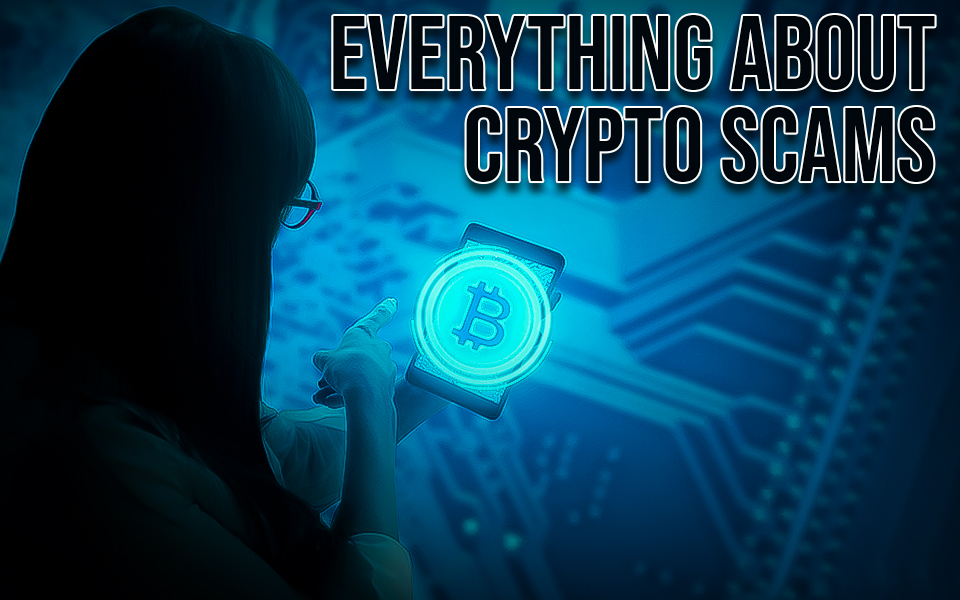


With the rise of digital currencies, cryptocurrency has become a fancy investment for gen z investors. All the hype and buzz about cryptocurrency has attracted fraudsters to try their strategies to con investors. The lack of regulation in the cryptocurrency market is helping scammers, which makes it easier for them to conduct fraudulent activities. In this article, we will discuss various crypto scams and how to protect yourself from falling victim to them.
Since Bitcoin is popular, Bitcoin scams/Bitcoin fraud are unfortunately all too common, and they can take many different forms. Some of the most common Bitcoin scams include fake bitcoins, Bitcoin-wallet fraud, fake Bitcoin currency, etc.
The scammers in these scams use fake websites, emails, or social media profiles to impersonate a legitimate cryptocurrency exchange or wallet provider. They then ask for your private keys, passwords, or other sensitive information, which they use to access your cryptocurrency wallet and steal your funds.
To avoid falling victim to a phishing scam, you should always verify the authenticity of any website or email that asks for your personal information. Check the URL of the website to ensure it matches the legitimate website of the cryptocurrency exchange or wallet provider. Additionally, never share your private keys or passwords with anyone, as they are the keys to your cryptocurrency wallet.
Ponzi schemes are another type of crypto scam that has become prevalent in recent years. In these schemes, scammers promise high returns on your cryptocurrency investments in a short period. In this scam, the scammers use the new investors’ investments to pay off the returns of existing investors, making it seem like the investment is legitimate. However, once the number of new investors dries up, the scheme collapses, and investors lose their money.
To avoid falling victim to a Ponzi scheme, you should always research before investing in any cryptocurrency investment opportunity. Companies’ reputations and reviews matter a lot to avoid scams and make the investment opportunity registered with the appropriate regulatory authorities.
Initial coin offerings are a popular way to raise funds for cryptocurrency start-ups. In an ICO, investors purchase new cryptocurrency tokens with the hope that the value of the tokens will increase in the future. However, fake ICOs have become a common way for scammers to steal money from unsuspecting investors.
Scammers create a bogus cryptocurrency token and promote it as a legitimate investment opportunity. They then ask investors to send their funds to a specific wallet address, promising high returns on their investment. However, once the investors send their funds, the scammers disappear, and the investors lose their money.
To avoid falling victim to a fake ICO, you should always do your research before investing in any new cryptocurrency token. Check the reputation of the company, read reviews from other investors, and make sure the ICO is registered with the appropriate regulatory authorities.
Crypto scammers creating fake cryptocurrency exchanges is another common way for scammers to steal money from unsuspecting investors. In a fake cryptocurrency exchange scam, scammers create a fake exchange website that looks like a legitimate cryptocurrency exchange. They then ask investors to send their funds to a specific wallet address, promising to buy or sell cryptocurrency on their behalf. However, once the investors send their funds, the scammers disappear, and the investors lose their money.
To avoid falling victim to a fake cryptocurrency exchange, you should always do your research before using any new exchange. Check the reputation of the exchange, read reviews from other users, and make sure the exchange is registered with the appropriate regulatory authorities. Report scam crypto exchanges to the cybercrime authorities to avoid further damage.
A DeFi wallet scam refers to a type of scam where fraudsters create a fake decentralized finance (DeFi) wallet to steal cryptocurrency or sensitive information from unsuspecting victims.
DeFi wallets are used to store cryptocurrencies and interact with various DeFi applications. They are designed to provide users with complete control over their funds, without relying on a central authority or intermediary. However, scammers may create fake DeFi wallets that look very similar to legitimate ones, to trick people into depositing their funds or giving away their private keys.
Once the victim sends their funds to the scammer’s wallet, it becomes almost impossible to recover them, since DeFi transactions are typically irreversible. In some cases, scammers may also steal sensitive information such as login credentials or private keys, which can be used to access the victim’s other accounts.
To avoid falling victim to a DeFi wallet scam, it’s important to only use reputable wallets and to carefully verify the authenticity of any wallet before sending funds or entering any sensitive information.
A rug pull crypto scam is a type of scam that can occur in the world of cryptocurrency. It is a deceptive practice where a person or a group of people create a cryptocurrency project and then suddenly disappear with all the funds that were invested in it. This leaves the investors with worthless tokens and no way to recover their money.
Rug pull scams often involve the creation of a new cryptocurrency project that promises high returns or innovative features. The creators will market the project aggressively and encourage people to invest in it, often using social media and other online platforms to reach a large audience.
Once enough money has been invested, the creators of the project will suddenly disappear, taking all the funds with them. This can happen in a matter of hours or days, leaving investors with nothing.
Several warning signs can help you spot a Bitcoin scammer:
Remember, if something seems too good to be true or if you feel uncomfortable, trust your instincts and avoid the potential scam.
Identifying fake cryptocurrency can be a challenging task, but there are some key things to look out for:
Look for information on the project’s team, roadmap, and community to help determine its legitimacy. Additionally, never invest more than you can afford to lose, and always exercise caution when dealing with cryptocurrencies.
Crypto scams have become increasingly prevalent in recent years, as scammers take advantage of the lack of regulation in the cryptocurrency market. To protect yourself from falling victim to a cryptocurrency scam, you should always do your research before investing in any new cryptocurrency investment opportunity. Check the reputation of the company, read reviews from other investors, and make sure of the investment opportunity. And for any crypto scams recovery services you can contact Zecoup.
A crypto scam is a fraudulent activity where crypto investors are trapped in a scam by promising high returns and unrealistic expectations.
Ponzi schemes, fake Initial Coin Offerings, phishing, and fake exchanges are a few common notable scams that occur frequently. Scammers often replicate websites or social media accounts to trick users into sending them their cryptocurrencies or money.
Report the scam to the concerned authorities, such as the cybercrime authorities or financial regulators. Contacting your bank or cryptocurrency exchange will help you to stop the transaction if there is a chance, which will help you recover your lost funds.
